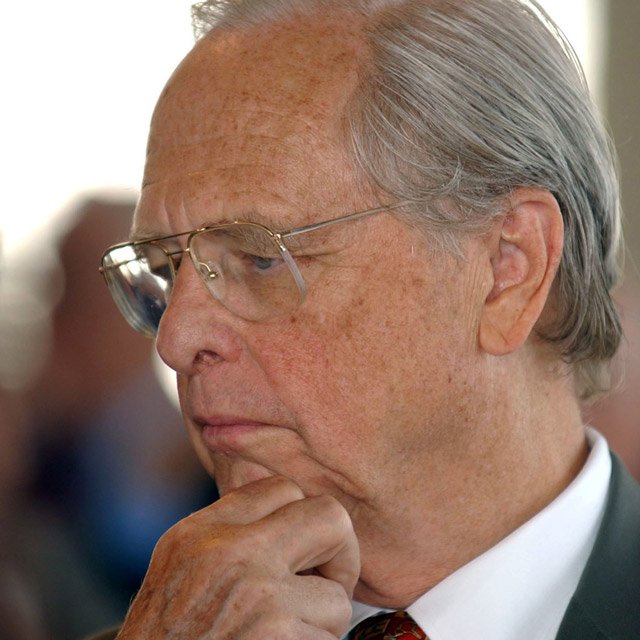Fidelity Fund Pioneer Edward Johnson III Dies at 91

What You Need to Know
Edward “Ned” Johnson III, who revolutionized the money-management industry while at Fidelity Investments, died at age 91.
Johnson pioneered the sale of mutual funds directly to individual investors rather than through brokers and abolished almost all of the firm’s 8% sales charges.
He became the first manager of Fidelity’s flagship fund, Magellan, in 1963, which he ran through 1971, beating the S&P 500 by an annual average of 22 percentage points.
Edward “Ned” Johnson III, who revolutionized the money-management industry by promoting mutual funds for retirement plans and money market checking accounts while head of Fidelity Investments, has died. He was 91.
He died on March 23 in Florida, according to Fidelity. No cause was given. He was a resident of Wellington, Florida, according to the firm.
“He loved his family, his coworkers, work, the stock market, art and antiquities, tennis, skiing, sailing, history and a good debate,” his daughter, Abigail Johnson, the firm’s chief executive officer since 2014, wrote in a LinkedIn post. “He could be counted on to have the contrarian view on just about anything.”
Ned Johnson was promoted in 1972 to president of the Boston-based firm his father had founded after World War II, and he served as chief executive officer until 2014. During his tenure at the top, assets jumped to more than $2.1 trillion from $3.9 billion, making Fidelity the second-biggest U.S. mutual fund company.
The firm now led by his daughter had $11.1 trillion in assets under administration, including $4.2 trillion in discretionary assets, as of Feb. 28.
With investing visionaries such as Charles Schwab and Vanguard Group Inc. founder John Bogle, Ned Johnson surfed the wave of financial market democratization and deregulation.
He pioneered the sale of mutual funds directly to individual investors rather than through brokers and abolished almost all of the firm’s 8% sales charges. He introduced 401(k) retirement plan management, in which Fidelity became the largest player.
He was the first to offer money market funds that allowed customers to write checks, competing directly with bank accounts. He fostered celebrity portfolio managers and offered low-fee index funds.
“He created the financial supermarket,” Peter Lynch, Fidelity’s superstar stockpicker in the 1980s, said in a 2019 interview. “He was like a juggler with 20 balls in the air. I don’t know how he ever did it.”
Ned Johnson amassed a net worth of $13.6 billion, according to the Bloomberg Billionaires Index. The bulk of his fortune was derived from his 12% stake in the closely held company, according to a regulatory filing.
Vanguard Surpasses
Fidelity was the world’s biggest mutual-fund manager for more than two decades until 2010, when it was surpassed by Vanguard, which benefited from investor demand for low-fee passively managed index funds.
Edward Crosby Johnson III was born to Edward Johnson II and Elsie Livingston Johnson on June 29, 1930, in the well-to-do Boston suburb of Milton. His father was a corporate lawyer at Ropes, Gray, Boyden & Perkins, which became Ropes & Gray. He took over management of the $3 million Fidelity Fund in 1943 and three years later founded Fidelity Management & Research Co. to act as its investment adviser.
The younger Johnson, after graduating from Harvard University in 1954 and serving in the U.S. Army for two years, joined Fidelity in 1957 as an analyst.
“I was not sure if I would find the investment business interesting,” Johnson wrote in a 1996 magazine article, “Adventures of a Contrarian.” “My father had given me a healthy respect for the market — a respect that came from his own experience watching a whole generation lose money in the late 1920s and 1930s. As a child, I knew you were not to play with the market, in the same way I knew not to play with matches, unless you knew what you were doing.”
Led Magellan
He became the first manager of Fidelity’s flagship fund, Magellan, in 1963, which he ran through 1971, beating the Standard & Poor’s 500 by an annual average of 22 percentage points. Magellan became one of the world’s largest and most successful mutual funds under Lynch, who ran it from 1977 to 1990.




